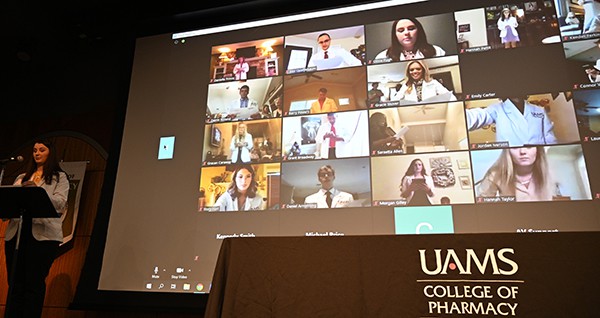Outreach Grows Minority Student Representation in College of Pharmacy
| The percentage of minority students in this fall’s incoming class at the UAMS College of Pharmacy is nearly double the percentage of the class that will graduate this coming spring.
“This year, in the class of 2024, we have 19% underrepresented minority students,” said Lanita White, Pharm.D., assistant dean for student affairs. “In the class of 2020, it’s only 10%. So, it’s very encouraging to see that percentage increase.”
Indeed, the incoming class has the highest percentage of underrepresented minority students in the college among any of its four classes and, importantly, its composition closely mirrors the population demographics of Arkansas.
“One of the things we always ask ourselves is, ‘do our classes reflect the state of Arkansas?’ The majority of our students in the UAMS College of Pharmacy are Arkansans. So we definitely want to make sure our class composition reflects our state as much as possible,” said White.
Diversity is about much more than numbers. Many studies have linked diversity in the health care workforce to better patient outcomes, which makes it a priority in recruitment of students as well as employees.
“We have to be intentional about ensuring representation across the student body, across the faculty, and across our staff. Every time there’s a position open, we think about where we post that position, where we go to find people who will add not only the best skill set but also diversity to our college,” said White.
Diversity also brings a difference of perspective in the educational environment.
“It brings a richness to the class because it changes conversations when you have a diverse class, whether that’s racial diversity, diversity of gender, diversity of thought from different regions geographically. Whatever that diversity is, it brings a richness to conversations in the classroom,” said White.
Fueling that growth in diversity is the Historically Black Colleges and Universities Med Track Program, an important part of a grant funded by the federal Health Resources and Services Administration last year. It’s enabled partnerships with University of Arkansas at Pine Bluff (UAPB) and Philander Smith College to help steer promising undergraduate students to careers in health sciences, including the UAMS colleges of Pharmacy, Medicine and Public Health.
Working with Renisha Ward, the education coordinator for the grant, White helped answer questions from students interested specifically in pharmacy, as well as those interested in medicine or science but unsure what to pursue.
“A lot of times, especially in hospitals, the pharmacists are either lost in the sea of white coats walking around or they may be in the hospital pharmacy where you as a patient or visitor may not see them or understand what their function is,” said White. “Many times in a community pharmacy, you won’t know who the pharmacist is and who the technician is. They’re all just people behind the counter.”
That can be difficult in any recruiting environment, but can prove even harder in some student populations, like those from rural or lower income backgrounds who may not have had any access or exposure to the profession beyond the neighborhood chain or independent pharmacist, if even that.
“These are students who wouldn’t be exposed, at least not firsthand, to a hospital pharmacist or a pharmacy student – or even a medical or nursing student. They’ve never seen that. And on top of that, they’ve probably never seen one who is a minority student like them,” said White. “That’s why our outreach programs and those of the Division for Diversity, Equity and Inclusion are so important.”
Already the work of those programs is starting to open new doors for new populations.
“I was particularly excited to see we have UAPB students enrolling, because we haven’t had a student from UAPB in at least five years,” said White. “This year, we got five students from UAPB, so from zero to five is really a huge increase. These are very competitive students, very accomplished students, who are academically exceptional and are as excited about the profession of pharmacy as we are about them being here.”
